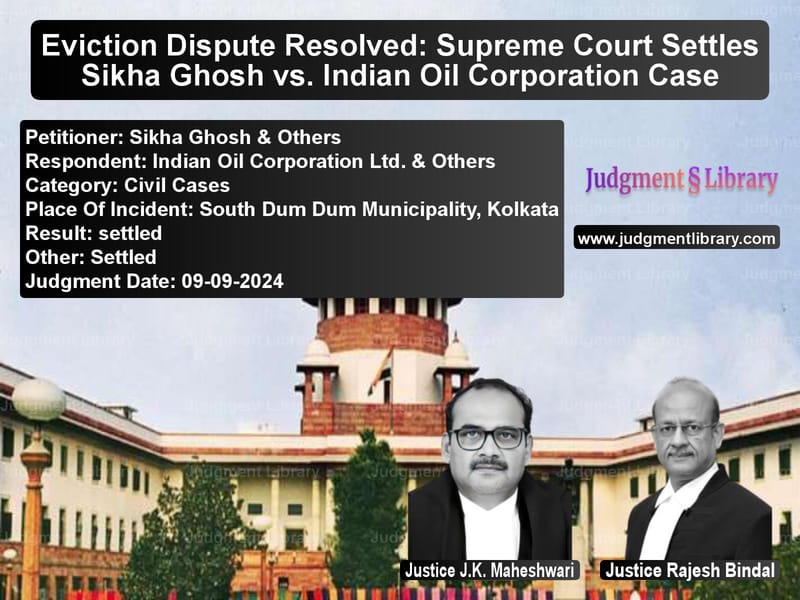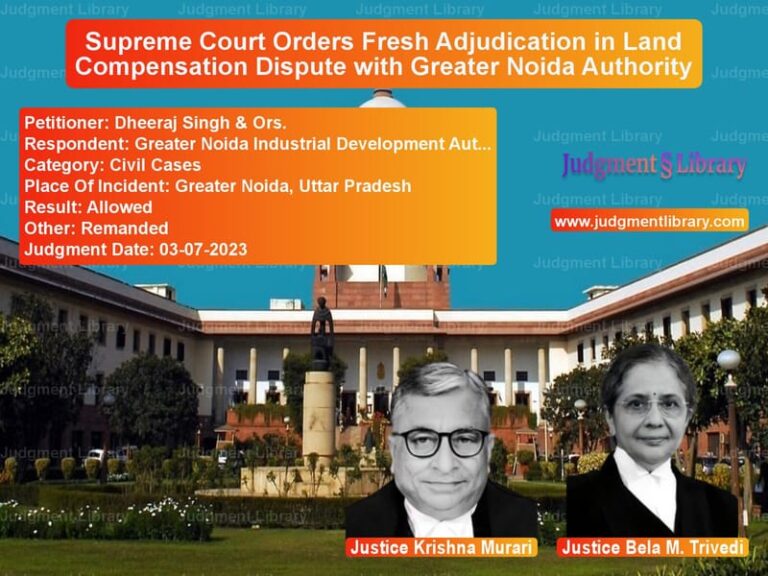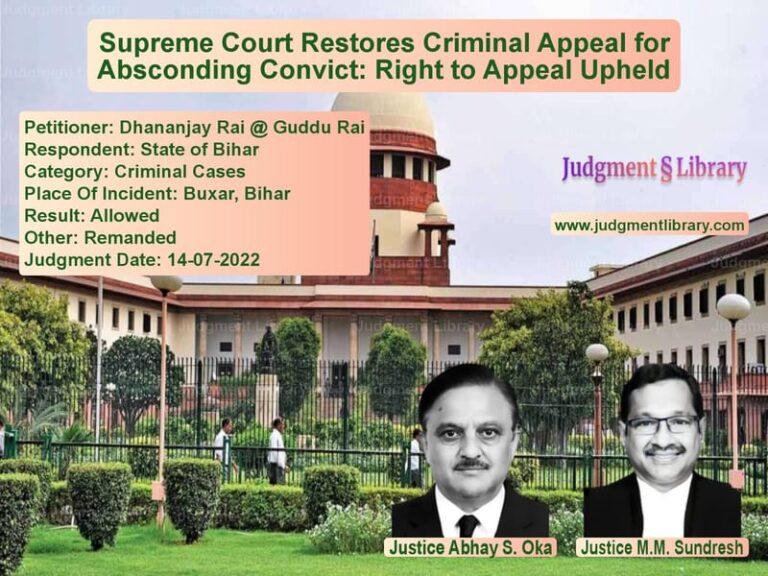Eviction Dispute Resolved: Supreme Court Settles Sikha Ghosh vs. Indian Oil Corporation Case
The case of Sikha Ghosh & Others vs. Indian Oil Corporation Ltd. revolved around a long-standing property dispute concerning the eviction of Indian Oil Corporation Ltd. (IOC) from a property in South Dum Dum Municipality, Kolkata. The legal battle, which started in the High Court and later reached the Supreme Court of India, culminated in an amicable settlement between the parties.
This case highlights key legal principles surrounding property disputes, writ jurisdiction, and the power of courts to facilitate settlements. In this article, we will delve into the details of the case, the legal arguments presented, and the final resolution by the Supreme Court.
Background of the Case
The dispute centered around a property located at Holding No.57, 58, Premises No.281, Ward No.20, South Dum Dum Municipality, Kolkata – 700089, covering approximately 6 Cottahs and 43 square feet. The petitioners (Sikha Ghosh & Others) were seeking the eviction of the respondents (Indian Oil Corporation Ltd.) from this property, arguing that they had no legal right to continue occupying the premises.
The respondents, Indian Oil Corporation Ltd., countered these claims, asserting that their occupation was justified and that any dispute over eviction involved complex factual issues, making it unsuitable for adjudication under writ jurisdiction.
Legal Proceedings in the High Court
- Writ Petition in the High Court (W.P.A. No. 20392 of 2021): The petitioners filed a writ petition before the High Court, seeking an order directing IOC to vacate and hand over the premises.
- Single Judge’s Ruling (16.08.2022): The learned Single Judge ruled in favor of the petitioners, ordering Indian Oil Corporation Ltd. to vacate the property. The judgment emphasized that the respondents had no legal grounds to continue occupying the premises.
- Appeal by Indian Oil Corporation (M.A.T. No. 1865 of 2022): Dissatisfied with the ruling, IOC challenged the order through an intra-court appeal. The Division Bench of the High Court, on 14.08.2023, reversed the decision, holding that the case involved disputed factual questions that could not be resolved under writ jurisdiction. The petitioners were directed to seek relief from an appropriate civil forum.
- Special Leave Petition in the Supreme Court (SLP No. 25782 of 2023): Aggrieved by the High Court’s reversal, the petitioners approached the Supreme Court.
Legal Issues and Arguments
The central issues before the Supreme Court were:
- Whether the writ jurisdiction of the High Court was the appropriate forum to decide the eviction dispute.
- Whether Indian Oil Corporation Ltd. had a legal right to remain in possession of the premises.
- Whether the dispute should have been adjudicated based on factual determinations requiring evidence, rather than a summary decision under writ jurisdiction.
Arguments by the Petitioners (Sikha Ghosh & Others)
The petitioners, through their legal counsel, contended that:
- Indian Oil Corporation Ltd. had no legal right to continue occupying the property, and their presence was unlawful.
- The High Court’s Single Judge had correctly ruled in favor of eviction, and the Division Bench erred in setting aside that order.
- The issue of possession did not involve disputed facts and could be determined under writ jurisdiction.
- Any delay in eviction was causing irreparable loss to the rightful owners.
Arguments by the Respondents (Indian Oil Corporation Ltd.)
The respondents countered with the following points:
- The matter involved complex factual determinations regarding possession, lease agreements, and financial transactions, which could not be decided under writ jurisdiction.
- The Division Bench of the High Court correctly ruled that the petitioners should approach an appropriate civil court.
- The eviction could not be ordered without affording IOC an opportunity to present evidence.
Supreme Court’s Mediation and Final Order
During the Supreme Court hearings, both parties arrived at a settlement, avoiding further litigation. The consensus terms included:
- Indian Oil Corporation Ltd. agreed to vacate and hand over the property to the petitioners by March 31, 2025.
- The petitioners agreed to forego claims to arrears of rent and mesne profits.
- Any amounts deposited in court would be refunded to IOC.
- Cheques or negotiable instruments issued by IOC in favor of the petitioners would be returned.
Supreme Court’s Final Directions
The Supreme Court, comprising Justice J.K. Maheshwari and Justice Rajesh Bindal, disposed of the case with the following key directions:
- IOC shall vacate the property and hand it over to the petitioners by March 31, 2025.
- The petitioners shall not claim any rent or mesne profits for past dues or for the period until IOC vacates.
- If IOC fails to comply, the petitioners shall have the right to initiate contempt proceedings or any other legal remedies.
- Any amounts deposited in court shall be refunded to IOC by bank transfer.
- The petitioners shall return all cheques or negotiable instruments issued by IOC.
- Upon compliance with these terms, neither party shall have any further claims against the other.
Key Takeaways
- This case underscores the importance of alternative dispute resolution mechanisms in property disputes.
- Courts encourage settlements to expedite legal proceedings and reduce the burden of litigation.
- The ruling highlights that writ jurisdiction may not always be the appropriate forum for eviction disputes involving factual complexities.
- It emphasizes the significance of mutually agreed settlements in ensuring fair and timely resolution.
Conclusion
The Supreme Court’s intervention facilitated a practical resolution, ensuring both parties could move forward without further litigation. The case highlights the judicial approach to balancing legal rights with pragmatic dispute resolution.
Petitioner Name: Sikha Ghosh & Others.Respondent Name: Indian Oil Corporation Ltd. & Others.Judgment By: Justice J.K. Maheshwari, Justice Rajesh Bindal.Place Of Incident: South Dum Dum Municipality, Kolkata.Judgment Date: 09-09-2024.
Don’t miss out on the full details! Download the complete judgment in PDF format below and gain valuable insights instantly!
Download Judgment: sikha-ghosh-&-others-vs-indian-oil-corporati-supreme-court-of-india-judgment-dated-09-09-2024.pdf
Directly Download Judgment: Directly download this Judgment
See all petitions in Property Disputes
See all petitions in Contract Disputes
See all petitions in Judgment by J.K. Maheshwari
See all petitions in Judgment by Rajesh Bindal
See all petitions in settled
See all petitions in settled
See all petitions in supreme court of India judgments September 2024
See all petitions in 2024 judgments
See all posts in Civil Cases Category
See all allowed petitions in Civil Cases Category
See all Dismissed petitions in Civil Cases Category
See all partially allowed petitions in Civil Cases Category







